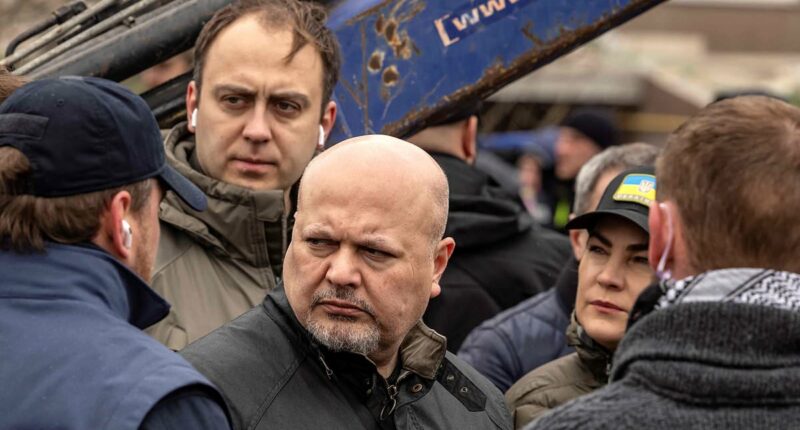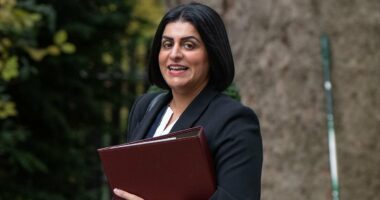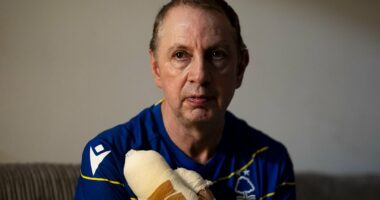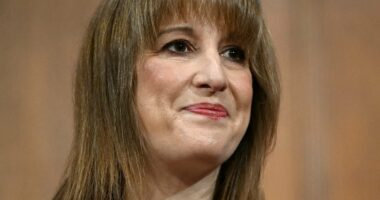Share this @internewscast.com
Before 2024, Karim Khan was a relatively obscure figure, known mainly among international legal professionals and diplomats. However, his decision in May 2024 catapulted him into the limelight. As the British chief prosecutor of the International Criminal Court, Khan’s actions sparked widespread attention and debate globally.
At the ICC’s headquarters in The Hague, Khan, aged 55, made a groundbreaking announcement. He had petitioned for arrest warrants against Israel’s Prime Minister Benjamin Netanyahu, former defense minister Yoav Gallant, and three Hamas leaders. The charges he leveled were severe, including accusations of using starvation as a military tactic, committing extermination or murder, and engaging in persecution.
This unprecedented move marked the first instance the court targeted leaders from a Western-backed democratic nation, making it a highly contentious decision.
Khan quickly faced a fierce backlash. The political repercussions were perhaps anticipated, but the intensity was significant. Then-US President Joe Biden labeled the charges as ‘outrageous,’ while Netanyahu called it a ‘moral outrage of historic proportions,’ and Gallant deemed it ‘despicable.’ Yet, Khan also faced personal challenges beyond the political arena.
Amidst the political turmoil and ongoing conflict in Gaza, Khan found himself under scrutiny with allegations of sexual misconduct emerging. These allegations gained traction within legal circles on both sides of the Atlantic.
A female lawyer in her 30s, who previously worked with Khan, accused him of unwanted advances, claiming he kissed, groped, and engaged in sexual acts with her without consent over an 11-month period. Khan has strongly denied these claims, which were first reported by The Mail on Sunday. An investigation into these allegations has been ongoing for a year, but no conclusions have been reached yet.
But many believe this was no ordinary sexual misconduct claim. There are allegations that the woman was a ‘plant’ by Mossad – Israel’s secret intelligence agency – and that her claims were a calculated attempt to discredit the controversial prosecutor.
The scandal took a dramatic twist last week when it was claimed that the woman herself had been targeted as part of a spying operation, said to have been commissioned by the Gulf state of Qatar – a major funder of Israel’s sworn enemy Hamas.

Prosecutor of the International Criminal Court (ICC), Karim Khan (pictured in Kyiv in April 2022) has faced allegations he kissed, groped and had sex with a 30-year-old lawyer without her consent over an 11-month period. He has denied the allegations

Prosecutor of the International Criminal Court (ICC), Karim Khan’s arrest warrant for Netanyahu was the first time the ICC had sought to arrest a Western-backed and democratically elected leader
So what, then, is the truth? Could the allegations simply be a ruse by Israel to bring down a troublesome prosecutor and torpedo the warrants – or is Khan a sexual predator whose victim has found herself an unwilling pawn in a shadowy political game? An investigation by this newspaper over many months has uncovered a complex web of alleged espionage and disinformation, and a blizzard of claims and counter-claims.
On one side of this increasingly tangled affair is the story of a young woman whose life has, she claims, fallen apart after what she describes as a sustained campaign of sexual harassment by Khan.
In her evidence to a probe by the UN’s watchdog, the Office of Internal Oversight Services, she claimed Khan assaulted her during a string of trips to New York, Colombia and Paris. She is said to have endured one such encounter by staring at a ‘crack in the ceiling’ as she ‘waited for it to finish’.
The MoS revealed earlier this year how Khan also allegedly sexually assaulted her in a hotel room in Chad, central Africa, just hours before making an impassioned speech, via video-link, to the United Nations. She also claimed Khan assaulted her at least ten times in his ICC office in The Hague – locking both office doors each time. It’s worth pointing out again that Khan vehemently denies all the allegations.
Friends of the woman have told the MoS that she is credible, highly intelligent and has been left deeply traumatised. Softly spoken and a self-confessed workaholic, she has spent long periods of this year in hiding, hundreds of miles from her husband and young child, because of fears that she is at risk as a ‘pawn’ in a much bigger geopolitical game. For months she has flitted between safe houses across Europe and the Far East, communicating only via encrypted messaging apps amid fears of electronic surveillance.
‘I spent six months in hiding, away from my child,’ she told the MoS in a statement this weekend. ‘Since returning, I barely leave my home. My husband still does not want me to be near the windows or to answer the front door.’
She perhaps has good reason, given the revelations last week that she and her family have been targeted by private investigators – more on which later.
Backers of Khan, however, tell a very different story. Some believe the allegations are part of a sophisticated operation by Mossad to plant stories and misinformation in the media that will destroy the prosecutor and torpedo the controversial arrest warrants. Mossad has a reputation for highly sophisticated covert operations that are meticulously planned for years.

Netanyahu with the director of Mossad David Barnea. There are allegations that the woman who accused Khan was a ‘plant’ by Mossad and that her claims were a calculated attempt to discredit the controversial prosecutor
Sources have even compared the allegations against Khan to the audacious ‘exploding pager plot’, in which Mossad, after a decade of planning, turned the gadgets into small bombs, triggering a wave of explosions that took out hundreds of Hezbollah fighters.
Such claims have angered his alleged victim, whose friends point out that she is a Muslim who strongly supported the ICC’s investigation into Israel’s leaders.
But what cannot be denied is that the ICC has been firmly in Mossad’s sights for years because of its perceived anti-Israeli position.
A probe last year reported that Mossad ran a covert operation against Khan’s predecessor, Fatou Bensouda, as part of a broader campaign of surveillance and espionage against the ICC. Israeli officials denied the allegations.
Suspicions that Mossad may also have attempted to undermine Khan’s reputation are centred on the bizarrely covert way in which his accuser’s allegations first reached the public domain.
Selected journalists, some of whom are known to be close to Israel, received an anonymous email in October 2024 with a document that outlined the allegations against Khan and included the alleged victim’s name, telephone number and other details – making it easy for them to investigate.
Curiously, there was also a single Hebrew word for ‘phones’ printed on the document and a rambling denial that Mossad was ‘threatening and blackmailing’ Khan.

A probe last year reported that Mossad ran a covert operation against Khan’s predecessor, Fatou Bensouda (pictured in 2018), as part of a broader campaign of surveillance and espionage against the ICC
Some have suggested the apparent mistaken use of a Hebrew word would be uncharacteristically sloppy of genuine Mossad operatives, leading to confounding counter claims that this could have even been a crude attempt to frame the spy agency.
Then on October 17, 2024, an anonymous account on X appeared, named @ICC_Leaks. The account’s owner claimed to be ‘personally familiar with the matter’, adding: ‘I am deeply concerned about the sexual harassment complaint being silenced at the ICC.’
Mystery, however, surrounds who was behind the anonymous email and X account. Was it the same person? Could it have been, as some claim, part of an Israeli influence operation? Or was it an elaborate double-bluff, with someone attempting to falsely lay the blame at Mossad’s door?
It is not, by any measure, the only perplexing episode in this story. This newspaper has heard the recording of an extraordinary hour-long telephone call between Khan and his alleged victim that took place months after the prosecutor first learned that she had complained to colleagues about his conduct. ‘I can’t see the forest for the trees,’ the woman told Khan. ‘I’m more tired of the situation more than anything else. Maybe it’s just time for me to go.’
Khan urged her not to quit and repeatedly asked whether she was recording the call. She lied and said she was not.
Meanwhile, in another twist, it was claimed last week that the woman has been targeted by private intelligence firms as part of a covert operation linked to Qatar.
It is claimed the highly intrusive investigation involved spies scouring the dark web for telephone numbers, email addresses and passwords linked to the alleged victim and her family.
Files, which have also been seen by this newspaper, indicate that investigators obtained the woman’s passport number and compiled a dossier on the employment history and personal lives of her husband and his parents. They also allegedly sought to obtain the woman’s marriage certificate and the birth certificate of her child.

Born to a British mother and Pakistani father, Khan grew up in Yorkshire and attended Silcoates School in West Yorkshire where fees are up to £21,300 a year. After reading law at King’s College London, he became a barrister and worked for the Crown Prosecution Service
The alleged aim of the operation was to find evidence to undermine the woman’s credibility, including efforts to establish connections between her and Israel. Documents linked to the investigation suggest no such evidence was found. Highgate, a strategic advisory firm in London, which is alleged to have been acting for Qatar, confirmed it had led an ‘assessment into potential covert or improper activities’ related to the ICC but said it had not ‘acted against any individual’. It denied the project was commissioned or directed by ‘any government entity’. Elicius, a corporate intelligence firm that was also allegedly involved, declined to comment.
Lawyers for Khan, the most obvious beneficiary, said he has ‘no knowledge’ of a secret operation targeting his accuser, adding: ‘Nor does he have any knowledge of any ‘strategic advisory firm’ or ‘corporate intelligence firm’ involved in any such operation.’
But, as the MoS can reveal, someone has made an extraordinary effort to make sure this story about the intelligence gathering appears in the media.
A source close to the scandal, whose motivation is difficult to grasp but is perhaps unsympathetic to Khan, last week briefed this newspaper and other select publications, providing a series of leaked documents linked to the alleged campaign against Khan’s accuser. It was clear a concerted effort was being made to keep the scandal in the headlines.
This paper has even been told that the alleged intelligence gathering may not have simply been limited to digging up dirt on Khan’s accuser.
Disturbingly, this newspaper was also allegedly in their sights in what was described as ‘stage two’ of the covert operation. ‘They are zeroed in on the MoS,’ one source said in a message sent via an encrypted messaging app. The source went on to explain that the investigators wanted to pinpoint who we had talked to in October 2024 before we revealed the misconduct allegations against Khan.
The alleged involvement of Qatar as a financial backer of the intelligence gathering adds yet another layer of intrigue.
The vastly wealthy Gulf nation plays a complicated role on the world stage. For years it was a major conduit of aid and cash for Hamas in Gaza, and hosted the terror group’s political leadership in Doha. But is also seen as a crucial mediator and its status as one of four guarantors of the ceasefire in Gaza – along with the US, Egypt and Turkey – is endorsed by Israel.
So could Qatar be playing a double game, acting as peace-broker while also targeting Khan’s accuser? Or is the Gulf state itself being framed as part of a disinformation campaign?
A spokesman for Qatar said it ‘strongly condemns the unfounded allegations’, adding: ‘These claims are part of a coordinated campaign by certain bad actors to spread disinformation.’
Like so much else related to this affair, nothing is quite as it seems – and amid the swirling controversy, the lives of the ICC’s chief prosecutor and his accuser remain in limbo.
For Khan, the scandal represents a rare setback in a promising career. Born to a British mother and Pakistani father, he grew up in Yorkshire and attended Silcoates School in West Yorkshire where fees are up to £21,300 a year. After reading law at King’s College London, he became a barrister and worked for the Crown Prosecution Service for two years before moving into international law.
He faces further claims from a second woman, who alleged in August that he abused his authority over her and repeatedly sought to pressure her into sexual activity. His lawyers have said ‘it is wholly untrue that he has engaged in sexual misconduct of any kind’.
They said Khan ‘categorically denies’ having ‘harassed or mistreated any individual, or having misused his position or authority, or engaged in any conduct that could be interpreted as coercive, exploitative or professionally inappropriate’. Meanwhile, his alleged victim voiced her anger at claims that she has been spied on.
In a statement to this newspaper last night, she branded the alleged intelligence gathering ‘a massive violation of my privacy and an indefensible intrusion into the lives of my loved ones, including a child’.
‘It beggars belief – I am a staff member of the International Criminal Court (and the complainant in this case, no less), and yet I am the one being investigated by intelligence-linked firms and strategic communications operatives.
‘It is a gross inversion of justice.’
















